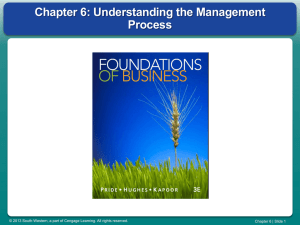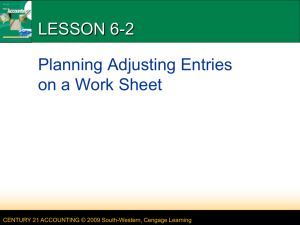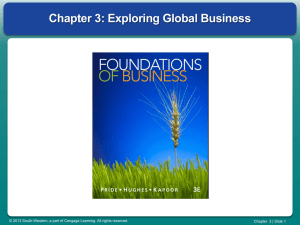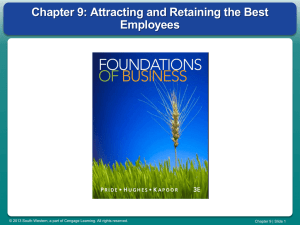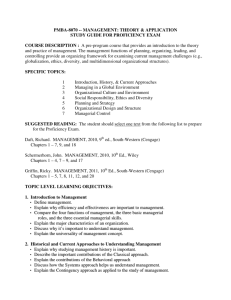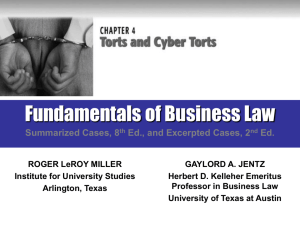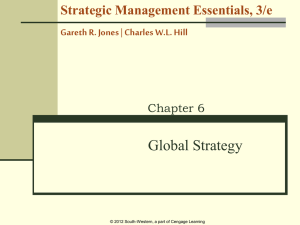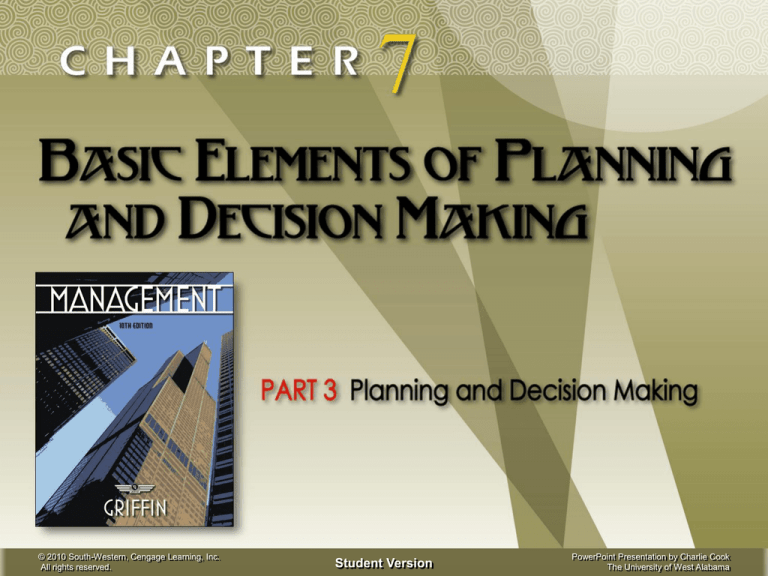
© 2010 South-Western, Cengage Learning, Inc.
All rights reserved.
Student Version
PowerPoint Presentation by Charlie Cook
The University of West Alabama
Decision Making and Planning
• Decision Making
Is the cornerstone of planning.
Is the catalyst that drives the planning process.
Underlies every aspect of setting goals and
formulating plans.
• Planning
All organizations plan, but not in the same fashion.
All planning occurs within an environmental context.
All goals require plans to guide in their achievement.
All goals are tied higher goals and plans.
© 2010 South-Western, Cengage Learning, Inc. All rights reserved.
7–2
Organizational Goals
Purposes of Goals
Guidance and
unified direction
Promotion of
good planning
© 2010 South-Western, Cengage Learning, Inc. All rights reserved.
Source of
motivation
Evaluation
and control
7–3
Kinds of Goals
Setting Organizational Goals
By Level
By Area
Time Frame
Mission statement
Strategic goals
Tactical goals
Operational goals
Operations
Marketing
Finance
Production
Long-term goals
Intermediate goals
Short-term goals
Explicit goals
Open-ended goals
© 2010 South-Western, Cengage Learning, Inc. All rights reserved.
7–4
Responsibilities of Setting Goals
• Who Sets Goals?
All managers
Managerial responsibility for goal setting
should correspond to the manager’s level
in the organization.
• Managing Multiple Goals
Optimizing allows managers to balance
and reconcile inconsistent or conflicting
goals.
Managers can pursue one goal and exclude
all others or to seek a mid-range goal.
© 2010 South-Western, Cengage Learning, Inc. All rights reserved.
7–5
Kinds of Organizational Plans
Strategic Plans
(upper management)
Tactical Plans
(middle management)
Operational Plans
(lower-level managers)
© 2010 South-Western, Cengage Learning, Inc. All rights reserved.
7–6
Time Frames for Planning
• The Time Dimension of Planning
Planning must provide sufficient time to fulfill the managerial
commitments involved.
1
5
10
Long-range (strategic)
plans of 5 or more years
Intermediate-range
(tactical) plans of 1–5 years
Short-range (operational)
action and contingency
plans of 1 year or less
© 2010 South-Western, Cengage Learning, Inc. All rights reserved.
7–7
Contingency Planning
and Crisis Management
• Contingency Planning
The determination of alternative courses of action to
be taken if an intended plan is unexpectedly disrupted
or rendered inappropriate.
These plans help managers to cope with uncertainty
and change.
• Crisis Management
The set of procedures the organization uses in the
event of a disaster or other unexpected calamity.
© 2010 South-Western, Cengage Learning, Inc. All rights reserved.
7–8
Managing Goal-Setting
and Planning Processes
• Barriers to Goal Setting and Planning
As part of managing the goal-setting and planning
process, managers must understand the barriers that
can disrupt them.
Managers must also know how to overcome them.
© 2010 South-Western, Cengage Learning, Inc. All rights reserved.
7–9
Using Goals to Implement Plans
• Management by Objectives (MBO)
A technique for integrating formal goal setting and
planning by giving subordinates a voice and clarifying
what they are expected to accomplish.
© 2010 South-Western, Cengage Learning, Inc. All rights reserved.
7–10
The Effectiveness of Formal Goal Setting
• Strengths (Success)
Improved employee motivation
Enhances communication
Fosters more objective
performance appraisals
Focuses attention on
appropriate goals and plans
Helps identify managerial
talent
Provides a systematic
management philosophy
Facilitates control of the
organization
© 2010 South-Western, Cengage Learning, Inc. All rights reserved.
• Weaknesses (Failure)
Poor implementation of the
goal setting process
Lack of top-management
support for goal setting
Delegation of the goal-setting
process to lower levels
Overemphasis on quantitative
goals
Too much paperwork and
record keeping
Managerial resistance to goal
setting
7–11
Key Terms
•
•
•
•
•
•
•
•
•
•
•
mission
strategic goal
tactical goal
operational goal
optimizing
strategic plan
tactical plan
operational plan
reaction plan
long-range plan
intermediate plan
© 2010 South-Western, Cengage Learning, Inc. All rights reserved.
•
•
•
•
•
•
•
•
•
short-range plan
crisis management
single-use plan
program
project
standing plan
policy
rules and regulations
management by
objectives (MBO)
7–12

